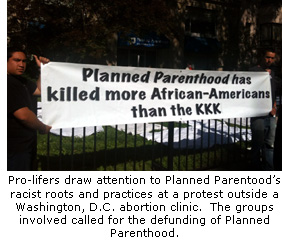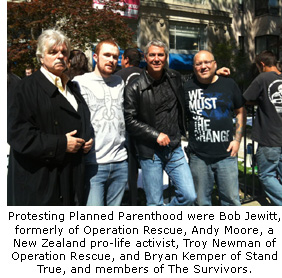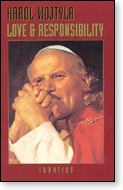John Paul II had a great devotion to this avocation of Jesus based on the revelations to St. Faustina Kowalska. His title of glory is his constant and integral defense of life and family, following the teaching of Saint Paul. For those of us who have received a call from the Lord to defend life and family, his beatification is a profoundly encouraging gesture of the Church, affirming the fundamental importance of our work. Let us take the opportunity afforded by his beatification to reflect upon and draw encouragement from some of his many writings and teachings.
The Holy Father proclaimed and developed Church doctrine on life and family in magisterial documents such as Familiaris Consortio and Evangelium Vitae, but these themes were also constantly present in many of his addresses and homilies.
At his address to the College of Cardinals on December 22, 1980, he made a magnificent statement, "We have to proclaim with strength the holiness of marriage, the value of the family, the intangibility of human life. I will never be tired of fulfilling this undelayable mission." In his long pontificate, he certainly fulfilled this promise. Indeed, less than three months before his death, even when his human energies were clearly waning, he again returned to this key theme of his papacy, addressing the Diplomatic Corps accredited to the Holy See:
The first is the challenge of life. Life is the first gift which God has given us, it is the first resource which man can enjoy. The Church is called to proclaim "the Gospel of Life". And the State has as its primary task precisely the safeguarding and promotion of human life. The challenge to life has grown in scale and urgency in recent years. It has involved particularly the beginning of human life, when human beings are at their weakest and most in need of protection. Conflicting views have been put forward regarding abortion, assisted procreation, the use of human embryonic stem cells for scientific research, and cloning. The Church's position, supported by reason and science, is clear: the human embryo is a subject identical to the human being which will be born at the term of its development. Consequently whatever violates the integrity and the dignity of the embryo is ethically inadmissible. ...
The challenge to life has also emerged with regard to the very sanctuary of life: the family. Today the family is often threatened by social and cultural pressures which tend to undermine its stability; but in some countries the family is also threatened by legislation which at times directly challenges its natural structure, which is and must necessarily be that of a union between a man and a woman founded on marriage. The family, as a fruitful source of life and a fundamental and irreplaceable condition for the happiness of the individual spouses, for the raising of children and for the well-being of society, and indeed for the material prosperity of the nation, must never be undermined by laws based on a narrow and unnatural vision of man.
John Paul II also saw the absolute relation between the defense of life and family and the social teachings of the Church, as he stated in a 2003 address to leaders of the Italian pro-life movement:
On receiving the Nobel Prize for Peace, venerable Mother Teresa of Calcutta, whom you consider the spiritual president of the pro-life movements in the world, had the courage to say to the leaders of political communities: 'If we let a mother kill the fruit of her womb, what is left to us? It is the principle of abortion that endangers peace in the world'. It is true! There can be no true peace without respect for life, especially if it is innocent and defenceless as is that of the unborn child. Elementary coherence requires those who seek peace to safeguard life. No pro-peace activity can be effective unless attacks on life at all its stages, from conception until natural death, are as energetically opposed.
In his major social Encyclical, Centessimus annus, John Paul II described the absolute connection between true social justice and the defense of life. With such statements he put to rest the false division between the social teachings of the Church and the Gospel of Life. Both teachings have to be integrated, because like all teachings of the Church, they cannot be separated from the wholeness of Catholic Doctrine.
He was fully aware that those who are completely committed to the integral defense of life are an ill understood and rejected minority. In 1987 at the Conference on the Right of Life in Europe he underlined in prophetic tones that being a minority should not discourage us. He showed how history demonstrates that real cultural changes only come from the actions of a minority that is ready to suffer extreme sacrifices. So we should never be discouraged, knowing as he said to HLI's founder, Fr. Paul Marx, "You are doing the most important work on Earth." This should serve as strong encouragement to all of us that we are committed to the pro-life mission of the Church.
John Paul II was also fully conscious of the failings of many members of the Church, as he pointed out in Evangelium Vitae:
Too often it happens that believers, even those who take an active part in the life of the Church, end up by separating their Christian faith from its ethical requirements concerning life, and thus fall into moral subjectivism and certain objectionable ways of acting. With great openness and courage, we need to question how widespread is the culture of life today among individual Christians, families, groups and communities in our dioceses. (E.V. 95)
Here, permit me to add a small personal memory. As director of HLI's Rome office I attended many meetings of the Pontifical Council of the Family and the Academy of Life, and I was often moved by the warmth with which he greeted all the persons in attendance and how he encouraged us in a very paternal way to strengthen our commitment to defend life and family. I will never forget the support that he gave to several officers of HLI in November of 1998 when we had a brief meeting with him on the occasion of the inauguration of the Rome of HLI.
Following the example of John Paul II, let us finish this brief reflection on all that this great Holy Father did in defense of life by seeking the loving intercession of our Blessed Mother, so that all the members of the Church would commit themselves to integrally defending life and family.























